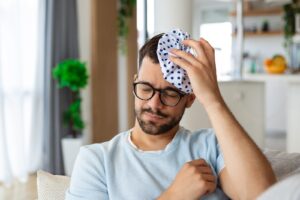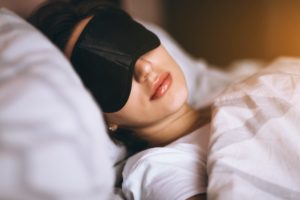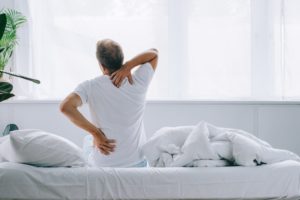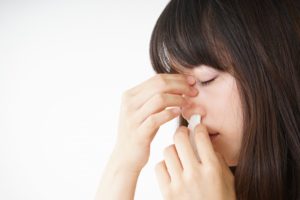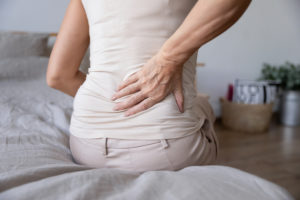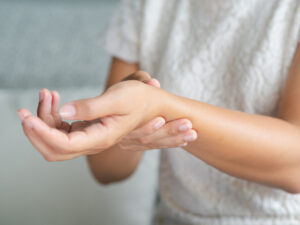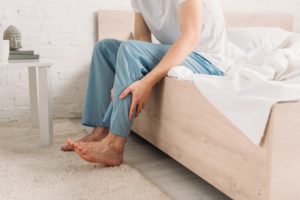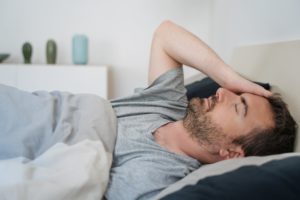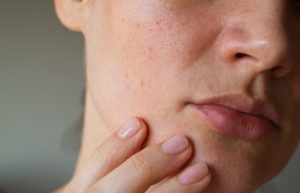Why Does My Body Ache When I Wake Up?
Waking up in pain is a common experience that can be caused by a number of different factors such as sleeping position, mattress, sleep disturbances, or health conditions. We discuss these factors related to pain and sleep and explore ways people can reduce or avoid this pain upon waking.
Sleeping Position
Sleeping in certain positions can cause pain. Sleeping in the prone position, or stomach sleeping, is the position most likely to cause pain in the morning or during the day.
A person can also experience muscle damage when they spend longer than ten minutes sleeping in a position with the spine rotated or flexed. In addition to pain upon waking, a poor sleep posture could cause a person to wake throughout the night, decreasing sleep quality.
Is Your Troubled Sleep a Health Risk?
A variety of issues can cause problems sleeping. Answer three questions to understand if it’s a concern you should worry about.
Mattress Quality
The type and quality of mattress that a person sleeps on determines the amount of support they receive and can affect whether or not they feel pain when waking up.
Discomfort and pain may be associated with different sleep surfaces . If a mattress is too hard or too soft relative to a sleeper’s body weight, their spine may not be properly aligned throughout the night, increasing the likelihood of feeling sore in the morning.
In general, medium to medium-firm mattresses are considered the best to reduce pain. Someone who weighs more may need more support to keep their spine in alignment throughout the night. If a sleeper has an older mattress, switching to a newer one may help reduce pain.
Sleep Disturbances
Falling short on sleep or not receiving enough high-quality sleep can both potentially cause chronic pain. Getting less sleep can not only cause muscle pains and headaches, but also make a person become more sensitive to pain overall. Experts suggest this may happen because disrupted sleep can cause inflammation , and inflammation can increase pain.
Additionally, there may be a relationship between pain and certain sleep disorders such as sleep apnea, which is characterized by periods of reduced or stopped airflow during sleep. Some individuals with sleep apnea are at increased risk for long-term pain. Also, having sore muscles is a symptom of jet lag.
“Consistent bedtime routines, a quiet and dark sleep environment, and treating any underlying sleep disorders can all help improve body aches when awakening.”
Dr. Lulu Guo, Sleep Physician
Health Conditions
Certain health factors and conditions can contribute to feeling sore or being in pain when waking up. These include, but are not limited to:
- Age above 45
- Stress
- Fibromyalgia
- Arthritis
- Plantar fasciitis
- Carpal tunnel syndrome
- Pregnancy
- A virus or the flu
- Injury
- Obesity
- Nutritional deficiency
There are numerous causes of pain related to sleep and waking up, so consider consulting your doctor or healthcare provider if you cannot identify the cause of your pain.
How to Prevent Pain When Waking Up
While the prevention of morning pain depends on its cause, there are multiple actions people can try to see if they help reduce pain upon waking.
Change Sleep Positions
One way a person may prevent body aches when waking up is to assess how they sleep, and try altering their position. Experts generally recommend sleeping on the back or on the side to prevent pain, rather than on the stomach.
Sleepers should make sure their head and neck are properly aligned with the rest of the body in whichever sleep position that they chose and avoid sleeping with the neck extended to further prevent neck pain .
Get a New Mattress or Pillow
Because mattress quality can have an effect on feeling achy in the morning, getting a new mattress or mattress topper that provides proper support may prevent pain. Some research studies have shown that people who stop using their old bedding and get new bedding experience an increased quality of sleep.
The type of mattress that provides proper support differs from person to person depending on their unique body and how they sleep. For example, someone with a higher body weight may need more firmness to support alignment in their spine.
When it comes to bedding beyond mattresses, some people find that replacing their pillow can help alleviate neck pain. The wrong pillow height or density can cause neck and shoulder pain. Putting a pillow under or between the knees for support throughout the night may help reduce pain in the morning.

Stretch Daily
Daily stretches can help reduce or prevent pain, especially when it comes to neck, back, joint, and muscle health. Overall, stretching can ease stiffness, increase flexibility, and reduce the risk of injury.
Exercise
Exercising can help reduce pain by strengthening muscles and spurring the release of endorphins, which are chemicals the brain produces that decrease pain. Exercise can also improve posture and reduce weight, which are both possible factors involved in morning achiness.
Some exercises may increase muscle soreness after exercise, so a person may temporarily feel sore when waking up in the days after working out. Sticking to an exercise routine should reduce this feeling of soreness over time.
Manage Stress
Stress may cause pain or intensify pain that is already there, so reducing and managing stressors can help treat or prevent pain felt when waking up. Common tips for managing stress include meditation, deep breathing, and setting aside time to unwind after a long day.
Exercises like yoga or tai chi can be useful tools for reducing stress.These techniques may also help prevent pain by increasing strength and flexibility. Massages may also help reduce stress while providing pain relief.

Still have questions? Ask our community!
Join our Sleep Care Community — a trusted hub of sleep health professionals, product specialists, and people just like you. Whether you need expert sleep advice for your insomnia or you’re searching for the perfect mattress, we’ve got you covered. Get personalized guidance from the experts who know sleep best.
References
6 Sources
-
Cary, D., Jacques, A., & Briffa, K. (2021). Examining relationships between sleep posture, waking spinal symptoms and quality of sleep: A cross sectional study. PLoS One, 16(11), e0260582.
https://pubmed.ncbi.nlm.nih.gov/34847195/ -
Jacobson, B. H., Boolani, A., & Smith, D. B. (2009). Changes in back pain, sleep quality, and perceived stress after introduction of new bedding systems. Journal of Chiropractic Medicine, 8(1), 1–8.
https://pubmed.ncbi.nlm.nih.gov/19646380/ -
Haack, M., Simpson, N., Sethna, N., Kaur, S., & Mullington, J. (2020). Sleep deficiency and chronic pain: potential underlying mechanisms and clinical implications. Neuropsychopharmacology : official publication of the American College of Neuropsychopharmacology, 45(1), 205–216.
https://pubmed.ncbi.nlm.nih.gov/31207606/ -
Hannibal, K. E., & Bishop, M. D. (2014). Chronic stress, cortisol dysfunction, and pain: a psychoneuroendocrine rationale for stress management in pain rehabilitation. Physical therapy, 94(12), 1816–1825.
https://pubmed.ncbi.nlm.nih.gov/25035267/ -
Isaac, Z. Management of non-radicular neck pain in adults. (2023, June 12). In S. Atlas (Ed.). UpToDate., Retrieved May 24, 2023, from
https://www.uptodate.com/contents/management-of-non-radicular-neck-pain-in-adults -
Aytekin, E., Demir, S. E., Komut, E. A., Okur, S. C., Burnaz, O., Caglar, N. S., & Demiryontar, D. Y. (2015). Chronic widespread musculoskeletal pain in patients with obstructive sleep apnea syndrome and the relationship between sleep disorder and pain level, quality of life, and disability. Journal of physical therapy science, 27(9), 2951–2954., Retrieved June 14, 2023, from
https://pubmed.ncbi.nlm.nih.gov/26504332/


